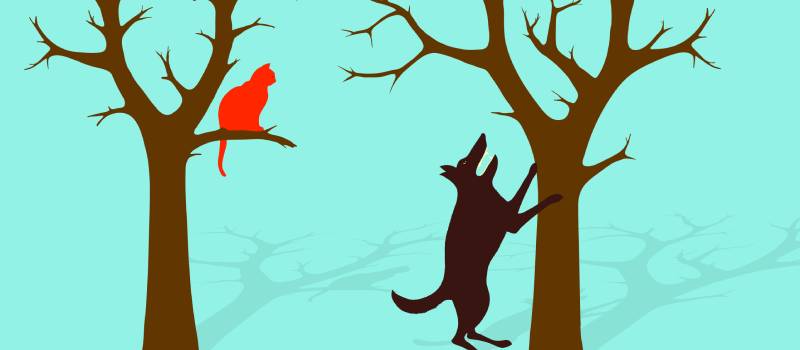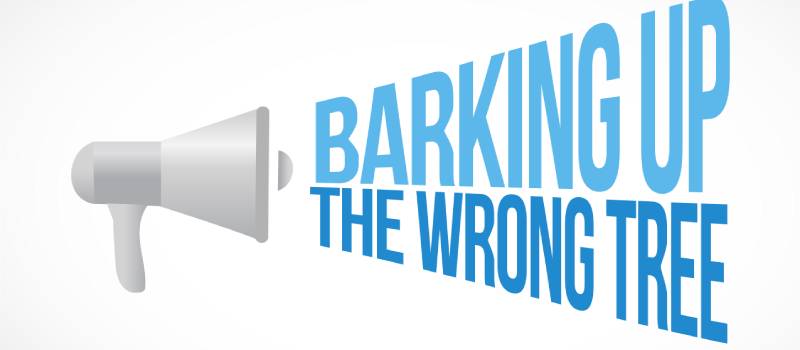It is safe to say that we’ve all heard the term “Barking Up The Wrong Tree” once in our lifetimes. This phrase rings a bell every time we think whoever is being addressed is not the correct party.
We will examine its meaning, origin, and the appropriate ways to use it in this article.
The idiom “Barking Up The Wrong Tree” means to alert someone that their current efforts are pursuing the wrong thing or path. When one sees another making a mistake or an incorrect assumption when attempting to achieve something, the term comes in handy.
Definition Of The Phrase
To better define the phrase, here’s this video for reference;
The dog in the video barks at a nonliving object (a dog statue) because it doesn’t realize that it won’t respond or interact with it. Consequently, giving us a very good idea about what “barking up the wrong tree” implies.
Definition: Making the wrong decision, asking the wrong person, or taking the wrong path is referred to as “barking up the wrong tree.” This idiom refers to a misplaced focus on a particular situation.
Origin

It’s not unusual for Southern phrases to include the word “barking up the wrong tree.” But have you ever wondered where this specific dog-related phrase came from?
In the nineteenth century, barking up the wrong tree was a popular phrase used to describe chasing raccoons with a hunting dog. This being due to the raccoons climbing up the trees and having the hunting dogs confused. Dog hunting was common. And the word was coined to suggest that the dog’s prey would deceive them into thinking they were in one tree when they had escaped.
The first printed citation is from James Kirke Paulding’s Westward Ho!, published in 1832:
“Here he made a note in his book, and I begun to smoke him for one of those fellows that drive a sort of a trade of making books about old Kentuck and the western country: so I thought I’d set him barking up the wrong tree a little, and I told him some stories that were enough to set the Mississippi a-fire; but he put them all down in his book.”
It is also good to bring to the forefront that the idiom began to get notoriety. Because of the literal contributions made by James Kirke that helped shape what we are now known as magazines.
When To Use It?
Spending one’s time and energy on the wrong thing or direction is a waste. Based on this we can determine when to use it.
As human beings, we are constantly searching for answers and not just any answers. Answers that we think are correct. This pursuit of knowledge leads to the usage of this idiom.
Whether it is having small talk with your friends and seeing them hit a roadblock or not achieving their desired goal.
Or simply noticing that a method you are using isn’t giving the results you are looking for.
You can use “Barking up the wrong tree” to alert and guide somebody towards the correct direction.
Interesting Facts

In Literature
The phrase “Barking up the wrong tree” has made its rounds amongst pop culture.
Writer Eric Barker has gained a lot of notoriety because of his NY Times best seller book “Barking up the wrong tree.”
In which he dives deep into the well-known maxims for success and checks out whether research can actually hold them up (or tear them down).
This book has also been called the MythBusters for success.
Additionally, writers all across the globe use this phrase as a big source of inspiration for marketing purposes.
The term “barking up the wrong tree” can apply in a variety of situations. The idiom continues to captivate the audience because it leaves space for a bigger picture.
In Film

From the page to the screen, the phrase “barking up the wrong tree” has been used in films to refer to getting off track. “White Chicks” (2004), a critically acclaimed and box office success, is no exception.
During the following scene;
We can see a man telling the woman hitting on him that she was barking up the wrong tree for lack of a better word.
Since then, this quote has ignited a lively debate within the LGBQI+ community, with a humorous twist. Since in today’s culture, we are often led astray by someone’s sexual orientation.
Further Reading: How Do You Use “However” In A Sentence?
In Music
All-round American entertainer, rockabilly drummer, and comedian Don Woody took this term to the bank in 1957 when he released a song called “Barking at the wrong tree,” which then became the title of his album released the same year.
The chorus of this song had a catchy hook, which was then clarified in the song’s bridge, where his suitor tells him he’s not the one she’s interested in;
Chorus:
And you’re barking up the wrong tree
Well, you’re barking up the wrong tree
Yes, you’re barking up the wrong tree
That’s what she said to me.”
This song made a lot of noise in the rock and roll era and has then been covered by many artists who’ve made their interpretation of the track.
In Politics
During the United States presidential campaign from 2012. Former president, Barak Obama, found himself in the middle of a debacle that began a campaign against him called “Barking up the wrong tree.”
This campaign’s focus was to highlight how Obama’s dog ownership made voters significantly less likely to vote; yes, I know, this is odd.
This started as a result of the former president’s public relationship with his dog “Bo,”
Due to this, some voters viewed him as a less qualified candidate to reform the legal system.
Since many people considered this campaign to be mediocre and irrelevant to the presidency, it received little to no media attention. I found myself laughing at this reality, but hey, the more you know.
Examples in a sentence
- Her plan is to solve the problem this way, but I think she’s barking up the wrong tree.
- Law enforcement took a long time investigating this case, yet they kept barking up the wrong tree.
- If you think those steps will solve the problem, you’re barking up the wrong tree.
- If you believe I’m spreading those rumors about you, you’re barking up the wrong tree.
- I had been warning you the whole time that you were barking up the wrong tree, but you ignored me and kept doing it.
- He’s barking up the wrong tree by practicing medicine if he wants to go to law school.
- I’ve spent 30 minutes trying to solve this math puzzle, and I think I’m barking up the wrong tree.
- Whenever there is a problem, the boss always barks up the wrong tree. She is constantly enraged by the wrong department.
- Retrospectively, it appears that both camps were barking up the wrong tree.
- If you think I ate your food, you’re barking up the wrong tree. I was even away from home this weekend!
- The man said that the police were barking up the wrong tree and that he had nothing to do with the bank robbery.
- If you ask him about English grammar, you’ll be barking up the wrong tree because he doesn’t know anything about it.
- Are you sure I’m not barking up the wrong tree?
Synonyms Of This Phrase
Now that we know, this means pursuing the incorrect line of inquiry while attempting to solve a problem or comprehend something.
Here are synonyms that imply the same idea:
Examples
- Off the mark
- Way off beam
- Off-target
- Wrongly identified
- On the wrong track
- Wrong-headed
- Unsubstantiated
- Inadequate
- Nowhere near
- Not thinking straight
Antonyms
Examples:
- Catching
- Getting
- Being certain
- Being sure
- Clearing up
- Conceiving
- Correcting
- Grasping
- Understanding
More Great Idioms
Conclusion
Looking out for people you care for can often be a challenge, yet, I think it’s good to say that “Barking up the wrong tree” hits the nail on the coffin.
When it comes to giving advice to others, it’s safe to say that we’ve realized how powerful this word can be.
Everyday communication will always include idioms. There’s no question that we’ll continue to hear the term “barking up the wrong tree“; the only difference is that you’ve now become an expert on the topic.
Shawn Manaher is the founder and CEO of The Content Authority. He’s one part content manager, one part writing ninja organizer, and two parts leader of top content creators. You don’t even want to know what he calls pancakes.

